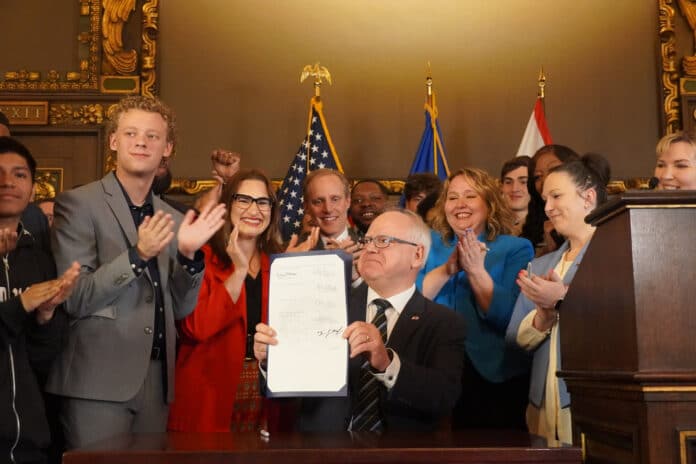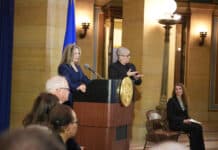
Gov. Tim Walz signed a partisan elections reform package into law Friday that received no Republican support, breaking from a longstanding Minnesota tradition of only signing bipartisan election legislation.
Walz said he would abide by this precedent in a 2019 interview, saying bipartisan support should be “the bar.”
“Yeah, I agree,” he said. “They should be bipartisan.”
Gov. Walz said in 2019 he would only sign bipartisan election legislation. Today he signed a bill to bring automatic voter registration and preregistration of 16-and 17-year-olds to Minnesota. It had no Republican support. pic.twitter.com/pr1M0mACbi
— Alpha News (@AlphaNewsMN) May 5, 2023
On Friday, Walz signed the “Democracy for the People Act” into law, a controversial package that received no Republican votes in either the House or Senate.
“Minnesota consistently leads the nation in voter turnout, and we plan to keep it that way,” Walz said in a statement. “We know that the more people vote, the more representative our state government can be. This bill will strengthen our democracy, allow future voters to get engaged early, and keep our campaigns honest and fair.”
Sen. Liz Boldon, DFL-Rochester, who carried the bill in the Senate, said her legislation is a “direct response to the extreme efforts to attack and undermine our democracy.”
The bill makes several significant changes to the state’s elections system, including allowing 16- and 17-year-olds to preregister to vote and providing voters with the option of being placed on a permanent absentee ballot list.
It will also automatically register people to vote when they interact with a government agency, such as when renewing or applying for a driver’s license.
Secretary of State Steve Simon said during a February committee hearing that this change could expand the pool of registered voters by 450,000.
The Upper Midwest Law Center has already promised to challenge a provision in the bill that makes it a crime to knowingly spread false information about the “time, place or manner” of an election within 60 days of Election Day, the Minnesota Reformer reported.
The recent high-profile case of Douglass Mackey caused outrage among conservatives, who argued Mackey was being persecuted by the federal government for sharing “memes” on his Twitter account.
During the 2016 election, Mackey posted images to Twitter that encouraged Hillary Clinton supporters to “avoid the line” and text in their votes. He was recently found guilty by a Brooklyn jury of “conspiracy against rights” and faces up to 10 years in federal prison.
Another provision will prohibit foreign-influenced corporations from donating in Minnesota elections. House Democrats rejected a GOP amendment to apply this same standard to foreign-influenced nonprofits.
“Minnesota has a long tradition of only making elections changes with bipartisan support,” Sen. Mark Koran, R-North Branch, said in a previous statement.
“This custom has served us well, and it is one reason why Minnesota’s election system is so well respected around the county. It is disappointing to see Democrats so casually throw that revered custom out the window in favor of a controversial, hyper-partisan agenda aimed at serving their special interest friends. This bill makes our elections weaker, riskier, less transparent, and less trustworthy.”
In a separate elections omnibus bill, Democrats are pushing to abandon the Electoral College and award Minnesota’s 10 electoral votes to the winner of the national popular vote.
















